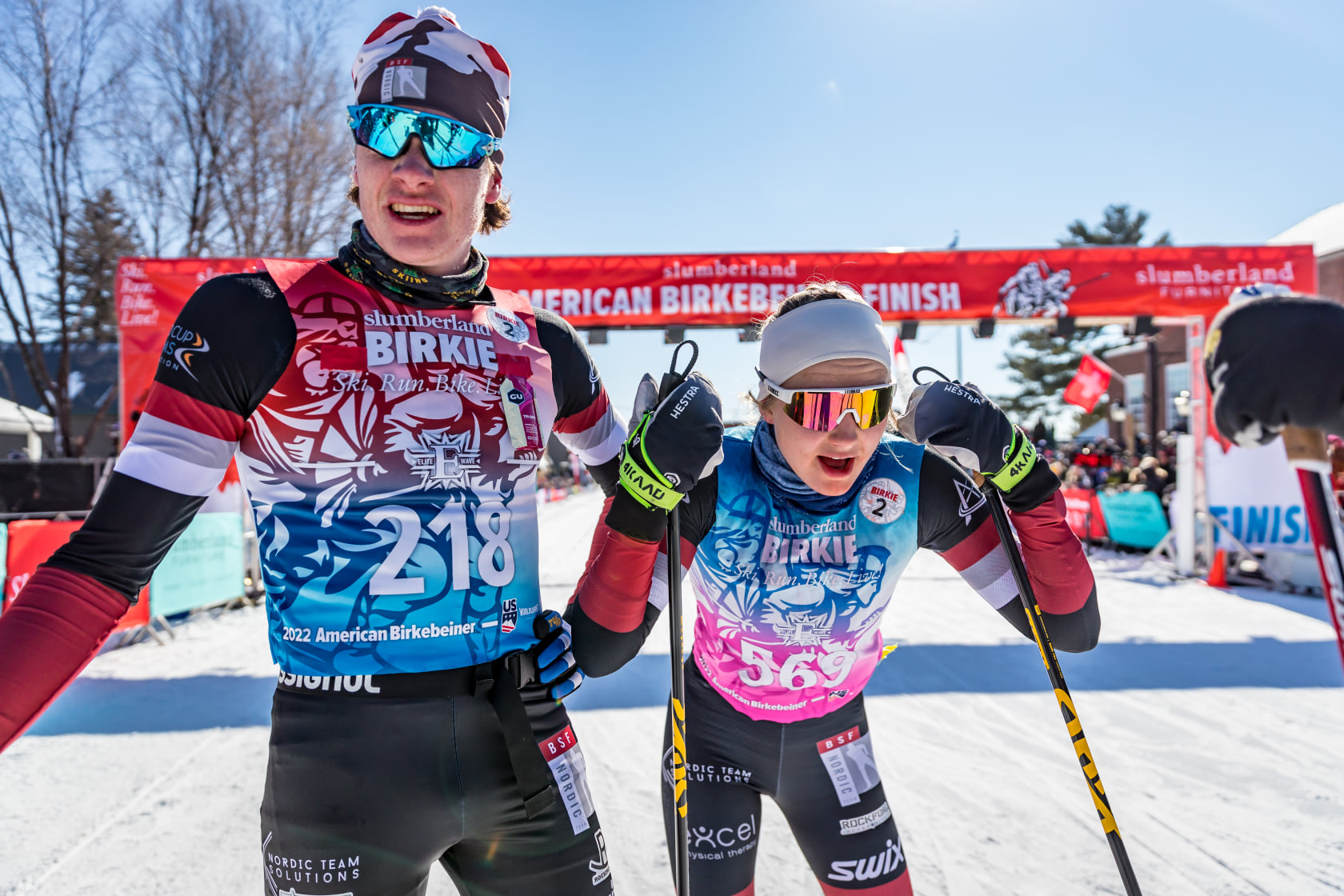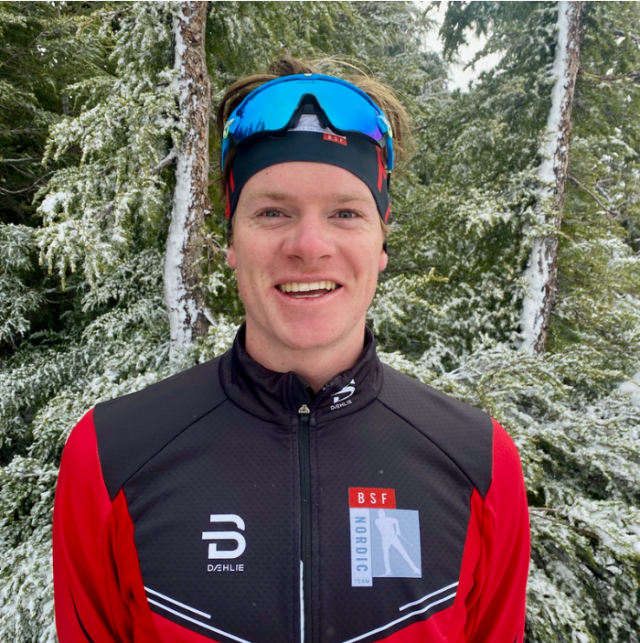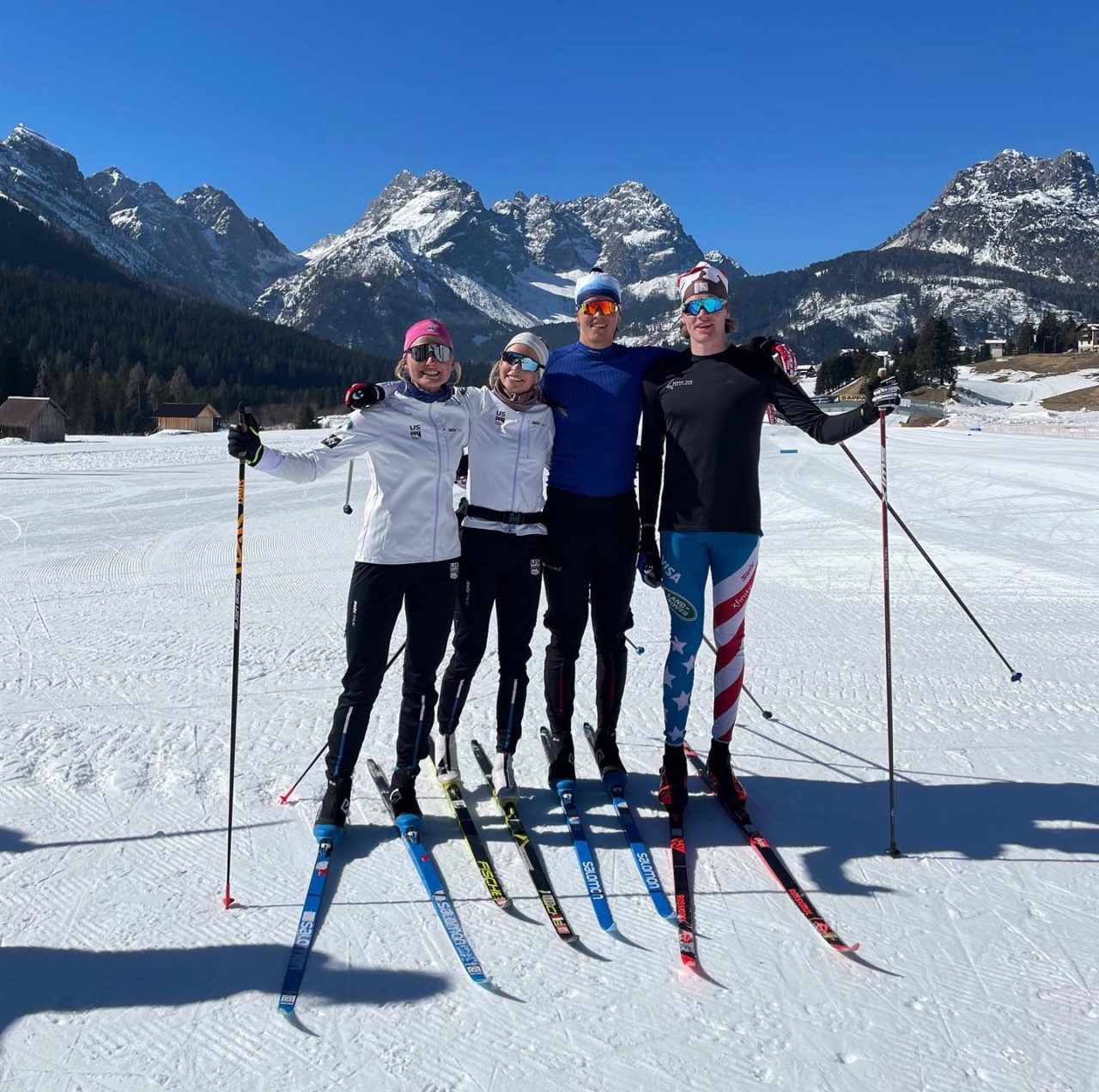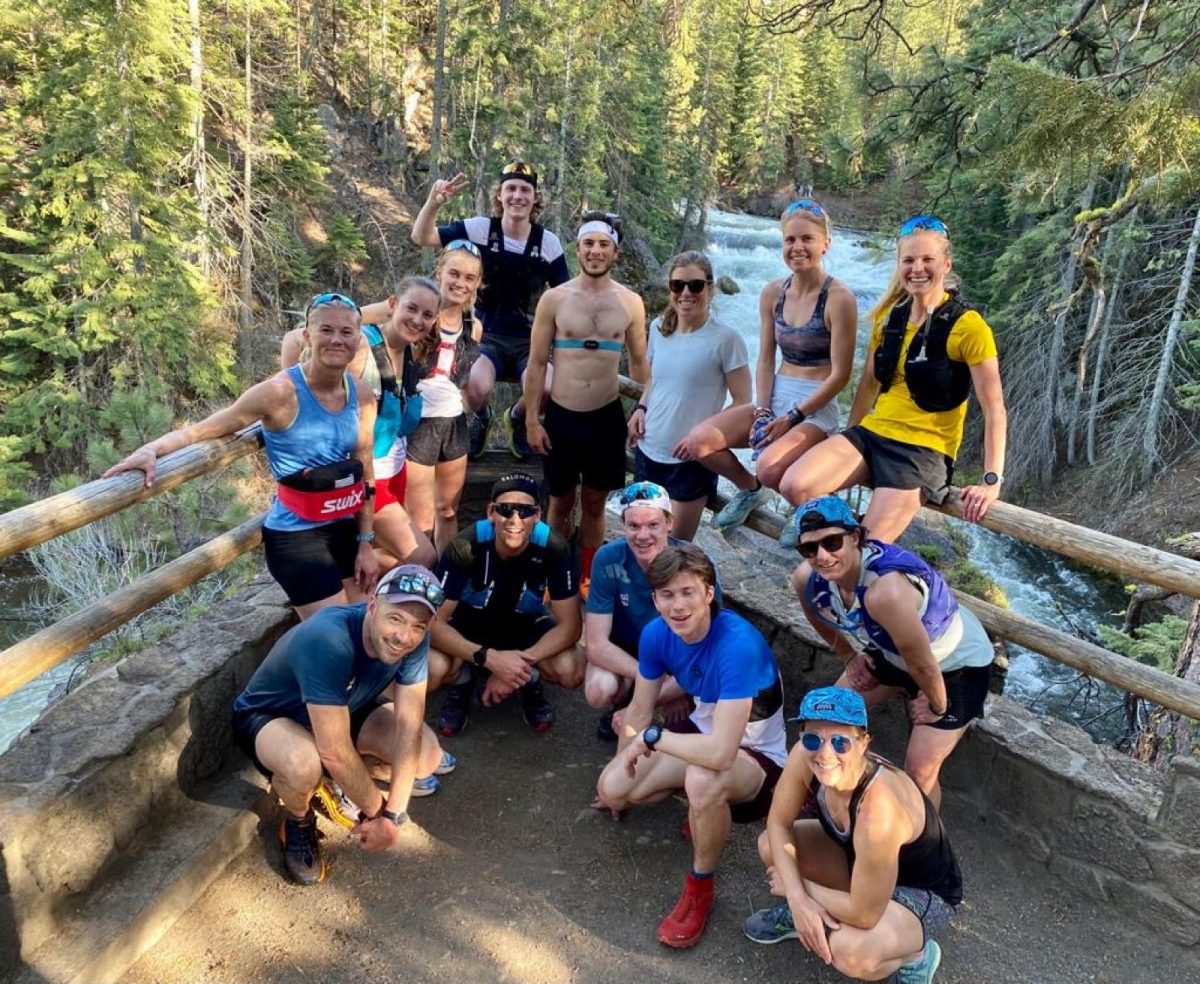U.S. Ski & Snowboard recently announced its U.S. Ski Team nominations for the 2022-23 season. Of the 22 athletes named to the team this season, six were not on the previous year’s roster, either newly named or renamed: Michael Earnhart, Walker Hall, Zak Ketterson, Will Koch, Finn O’Connell, and Sammy Smith.
To help fans get to know these new(er) faces, FasterSkier is doing a series of interviews, providing insights into the factors that have contributed to development, progress, and growth for these athletes last season. In this installment, we talk with Finn O’Connell following his nomination to the U.S. Ski Team on its B-Team. O’Connell discusses his background in skiing, what contributed to his success this season, and his goals and focus heading into next winter.

FasterSkier/Ben Theyerl: Can you start off by telling us just a little bit about yourself, where you’re from where you’ve seen in the past and where you’re skiing now?
Finn O’Connell: I grew up in Steamboat Springs, Colorado, and was a Nordic combined athlete – doing ski jumping and [only] skate skiing until my junior year of high school. I decided that I wanted to go pursue a college degree, but because there was nowhere to do combined in college, I dropped ski jumping and learned how to classic ski. I was offered a spot on the University of Vermont despite senior year [of high school] really being the first time I’d ever classic skied.
It took me a year to get into college skiing and it was really not until my sophomore year that I had [strong] results. I opened up that season with a second place and then just kind of kept the podiums going through my sophomore year. EISA and NCAA skiing lead to U23 World Championships in 2020, during my senior year. While I was [in Bozeman] at NCAAs Andy Newell at Bridger Ski Foundation (BSF) emailed me wondering if I’d be interested in joining their new team. I was already thinking I wanted to move back West, but I didn’t know if I’d keep skiing or not. The BSF team happened and I was stoked, so now I’ve been here for two years and I’m just excited, with Newell and my teammates, to get going.

FS: That takes us up to today. Congratulations on your U.S. Ski Team nomination. Take us back to the beginning of this past season, what were your goals?
FO: My first year with BSF (2020-21) I was offered a World Cup start and then through complications with COVID, those were cancelled. My goal because of that was to get some World Cup starts and prove myself as a top distance skier and see if the Olympics were in the cards this time around (2021-22). And then, again, as soon as I got offered a World Cup spot [this January] COVID cancelled those races, which was a big bummer. That was right around when Olympic qualification ended, and so from there, I just skied with no real pressure on racing fast and just had fun. I had some successful SuperTour races and went to OPA Finals in Italy. That ended up being a really great place to earn FIS points, which helped towards my nomination as it turned out.
Through the weirdness of COVID, the World Cups didn’t come this year, but overall, I think I achieved my goal to prove I could compete on the highest level in skiing.
FS: I want to pause on COVID as from what you’re saying there it’s been a big factor for you all the way through your transition from collegiate skiing to primarily being a pro. How big of a challenge has that been?
FO: I didn’t really know what being a “professional” skier looked like honestly until my second season, because my first year doing it was really tagging along to college races (BSF raced with the RMISA circuit for select races in 2020-21). Other than the Birkie, there was just nothing [for pro skiing].
I think, looking back, that season helped me make some bigger improvements than other skiers. Primarily because I still am behind the curve on learning to classic ski, so having that as motivation to improve, and having the resources with Newell and my teammates at BSF just really helped me to keep getting better.
FS: Specifically on COVID blocking the World Cup starts for you, that’s left you with fewer opportunities to race internationally than some of your US teammates. Does that play into what you’re prioritizing for this upcoming season?
FO: I’m definitely looking forward to getting over [to Europe] and racing. I’m not bummed on missing out the past two seasons because the guys who were over there during COVID deserved those starts. But I would be lying if I said I wasn’t itching to finally race with the others on the U.S. Ski Team and the other best skiers in the world. I really am pumped to show others what I’m capable of.

FS: On that U.S. Team, this men’s team is very young. You’ve been teammates with some of the guys that are even younger than you, like Ben Ogden while you were at UVM. How do you approach joining a group of skiers that’s already been skiing together for a few years?
FO: Even in Bend, I could tell it was going to be a very smooth transition. I know most of the men and women on the team from racing college, even if we just overlapped for one year out East. And then, racing the RMISA with BSF last year helped introduce me to skiers in the West.
I will say it’s weird to feel like I’m a rookie and am already one of the older people on the team.
FS: The U.S. men’s team has some big breakthrough results from the past couple of seasons, especially leaning towards the sprint side of the sport. In contrast to that, your notable results have been some really great distance races. Does that play into what World Cup starts you’re targeting this year?
FO: Yeah, I think I can only pinpoint one sprint race I’ve ever done that’s really stood out to me. Having Newell as a coach definitely has helped, like I’m qualifying for heats now at least, but my main focus is definitely away from sprinting when it comes to the World Cup. I probably wouldn’t get any of those starts, and I don’t really want to get any of those starts. I want to keep my focus on distance skiing.
FS: I wanted to also cover some of the other parts of your background that are unique. You’re from Steamboat Springs, which if your goal is to become a Winter Olympian is one the best places to be from in terms of the number of athletes who have achieved that. How did growing up there help you get to where you are now?
FO: I think a lot of it was just how many different sports and types of skiing I was able to kind of compete in. And even there, not all the time feeling like I had to compete, but that I could just have fun and be a multi-sport athlete if I wanted. That’s definitely contributed to me still being in Nordic skiing.
FS: The Nordic combined thing really strikes me as unique too. That’s a niche sport and I know of a lot of Nordic Combined skiers end up dropping the cross country to just focus on ski jumping. What made the cross country side more attractive for you?
FO: Yeah, I do think I was unique in that even though I jumped first, my cross-country skiing was always better than my jumping.
That, and circumstance. When I was in high school seven years ago, jumping and Nordic combined had just been dropped by U.S. Ski & Snowboard, and USA Nordic hadn’t really been formed yet. It was looking like the support for me might not be there if I stayed in combined, even if I did what you end up doing as a U.S. Team member, which is moving to Park City and pretty much forming a day-to-day training group with the other U.S. Team members. I had goals outside of skiing I knew I wanted to pursue, which meant going to college, and that was an option in cross country skiing and not an option with the Nordic combined program at that time. I took the leap to focus solely on the cross country side of things.
FS: From there you’ve now worked with some coaches who’ve had the international experience that you’re now setting your target on with Patrick Weaver (UVM) and Andy Newell (BSF). How is that helping as you start to look at taking things to the World Cup next season?
FO: I would say on both those guys that even though you’re aware of their success racing, the thing that sticks out working with them is more how passionate they are in their training, technique, video sessions, and how they approach racing.
With Patrick, you obviously have an idea that he was an Olympian multiple times over back in the day, but I think the international racing world has changed a lot and while he’s working with you, he’s very focused on what he knows as a coach which is the college circuit.
With Newell, I’m working with him as those goals become achievable, and so there’s a lot of focus around what international racing looks like. He just knows the ins and outs of that circuit so well from doing it for so many years, and his mindset is something I really look to when it comes to thinking about how to feel good while chasing that dream of skiing internationally.

FS: Do you have any other thoughts on the U.S. Ski Team or what you’re looking forward to next season?
FO: I’m just super stoked. If I’m honest, I wasn’t really expecting the nomination. I couldn’t see the latest FIS points list and didn’t really know what the future of me skiing was going to look like at the end of this season. I’ve always wanted to be a pilot and was starting to think about pursuing that more seriously.
But then I got the call and I just kind of thought, well, “how cool of an opportunity I have” and so just decided I was going to stay very focused on the skiing, and I’m super excited to see where that takes me.
Ben Theyerl
Ben Theyerl was born into a family now three-generations into nordic ski racing in the US. He grew up skiing for Chippewa Valley Nordic in his native Eau Claire, Wisconsin, before spending four years racing for Colby College in Maine. He currently mixes writing and skiing while based out of Crested Butte, CO, where he coaches the best group of high schoolers one could hope to find.



